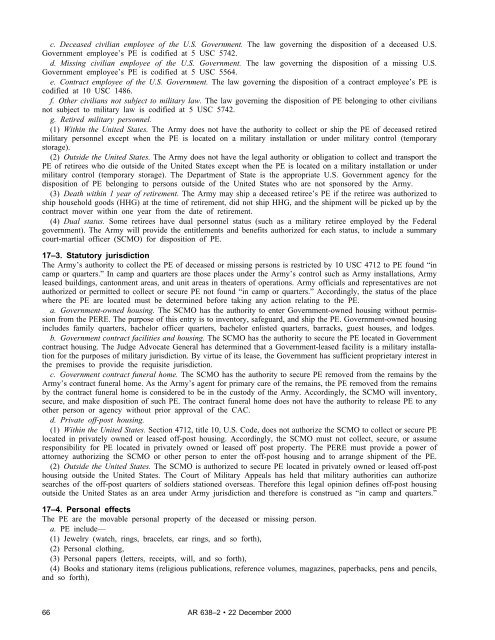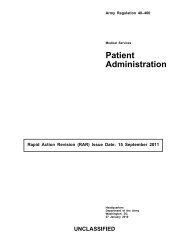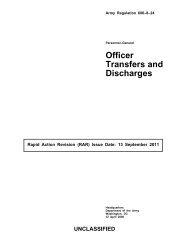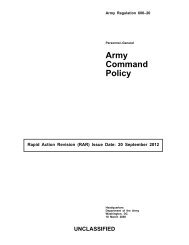Care and Disposition of Remains - Army Publishing Directorate ...
Care and Disposition of Remains - Army Publishing Directorate ...
Care and Disposition of Remains - Army Publishing Directorate ...
You also want an ePaper? Increase the reach of your titles
YUMPU automatically turns print PDFs into web optimized ePapers that Google loves.
c. Deceased civilian employee <strong>of</strong> the U.S. Government. The law governing the disposition <strong>of</strong> a deceased U.S.<br />
Government employee’s PE is codified at 5 USC 5742.<br />
d. Missing civilian employee <strong>of</strong> the U.S. Government. The law governing the disposition <strong>of</strong> a missing U.S.<br />
Government employee’s PE is codified at 5 USC 5564.<br />
e. Contract employee <strong>of</strong> the U.S. Government. The law governing the disposition <strong>of</strong> a contract employee’s PE is<br />
codified at 10 USC 1486.<br />
f. Other civilians not subject to military law. The law governing the disposition <strong>of</strong> PE belonging to other civilians<br />
not subject to military law is codified at 5 USC 5742.<br />
g. Retired military personnel.<br />
(1) Within the United States. The <strong>Army</strong> does not have the authority to collect or ship the PE <strong>of</strong> deceased retired<br />
military personnel except when the PE is located on a military installation or under military control (temporary<br />
storage).<br />
(2) Outside the United States. The <strong>Army</strong> does not have the legal authority or obligation to collect <strong>and</strong> transport the<br />
PE <strong>of</strong> retirees who die outside <strong>of</strong> the United States except when the PE is located on a military installation or under<br />
military control (temporary storage). The Department <strong>of</strong> State is the appropriate U.S. Government agency for the<br />
disposition <strong>of</strong> PE belonging to persons outside <strong>of</strong> the United States who are not sponsored by the <strong>Army</strong>.<br />
(3) Death within 1 year <strong>of</strong> retirement. The <strong>Army</strong> may ship a deceased retiree’s PE if the retiree was authorized to<br />
ship household goods (HHG) at the time <strong>of</strong> retirement, did not ship HHG, <strong>and</strong> the shipment will be picked up by the<br />
contract mover within one year from the date <strong>of</strong> retirement.<br />
(4) Dual status. Some retirees have dual personnel status (such as a military retiree employed by the Federal<br />
government). The <strong>Army</strong> will provide the entitlements <strong>and</strong> benefits authorized for each status, to include a summary<br />
court-martial <strong>of</strong>ficer (SCMO) for disposition <strong>of</strong> PE.<br />
17–3. Statutory jurisdiction<br />
The <strong>Army</strong>’s authority to collect the PE <strong>of</strong> deceased or missing persons is restricted by 10 USC 4712 to PE found “in<br />
camp or quarters.” In camp <strong>and</strong> quarters are those places under the <strong>Army</strong>’s control such as <strong>Army</strong> installations, <strong>Army</strong><br />
leased buildings, cantonment areas, <strong>and</strong> unit areas in theaters <strong>of</strong> operations. <strong>Army</strong> <strong>of</strong>ficials <strong>and</strong> representatives are not<br />
authorized or permitted to collect or secure PE not found “in camp or quarters.” Accordingly, the status <strong>of</strong> the place<br />
where the PE are located must be determined before taking any action relating to the PE.<br />
a. Government-owned housing. The SCMO has the authority to enter Government-owned housing without permission<br />
from the PERE. The purpose <strong>of</strong> this entry is to inventory, safeguard, <strong>and</strong> ship the PE. Government-owned housing<br />
includes family quarters, bachelor <strong>of</strong>ficer quarters, bachelor enlisted quarters, barracks, guest houses, <strong>and</strong> lodges.<br />
b. Government contract facilities <strong>and</strong> housing. The SCMO has the authority to secure the PE located in Government<br />
contract housing. The Judge Advocate General has determined that a Government-leased facility is a military installation<br />
for the purposes <strong>of</strong> military jurisdiction. By virtue <strong>of</strong> its lease, the Government has sufficient proprietary interest in<br />
the premises to provide the requisite jurisdiction.<br />
c. Government contract funeral home. The SCMO has the authority to secure PE removed from the remains by the<br />
<strong>Army</strong>’s contract funeral home. As the <strong>Army</strong>’s agent for primary care <strong>of</strong> the remains, the PE removed from the remains<br />
by the contract funeral home is considered to be in the custody <strong>of</strong> the <strong>Army</strong>. Accordingly, the SCMO will inventory,<br />
secure, <strong>and</strong> make disposition <strong>of</strong> such PE. The contract funeral home does not have the authority to release PE to any<br />
other person or agency without prior approval <strong>of</strong> the CAC.<br />
d. Private <strong>of</strong>f-post housing.<br />
(1) Within the United States. Section 4712, title 10, U.S. Code, does not authorize the SCMO to collect or secure PE<br />
located in privately owned or leased <strong>of</strong>f-post housing. Accordingly, the SCMO must not collect, secure, or assume<br />
responsibility for PE located in privately owned or leased <strong>of</strong>f post property. The PERE must provide a power <strong>of</strong><br />
attorney authorizing the SCMO or other person to enter the <strong>of</strong>f-post housing <strong>and</strong> to arrange shipment <strong>of</strong> the PE.<br />
(2) Outside the United States. The SCMO is authorized to secure PE located in privately owned or leased <strong>of</strong>f-post<br />
housing outside the United States. The Court <strong>of</strong> Military Appeals has held that military authorities can authorize<br />
searches <strong>of</strong> the <strong>of</strong>f-post quarters <strong>of</strong> soldiers stationed overseas. Therefore this legal opinion defines <strong>of</strong>f-post housing<br />
outside the United States as an area under <strong>Army</strong> jurisdiction <strong>and</strong> therefore is construed as “in camp <strong>and</strong> quarters.”<br />
17–4. Personal effects<br />
The PE are the movable personal property <strong>of</strong> the deceased or missing person.<br />
a. PE include—<br />
(1) Jewelry (watch, rings, bracelets, ear rings, <strong>and</strong> so forth),<br />
(2) Personal clothing,<br />
(3) Personal papers (letters, receipts, will, <strong>and</strong> so forth),<br />
(4) Books <strong>and</strong> stationary items (religious publications, reference volumes, magazines, paperbacks, pens <strong>and</strong> pencils,<br />
<strong>and</strong> so forth),<br />
66 AR 638–2 • 22 December 2000
















